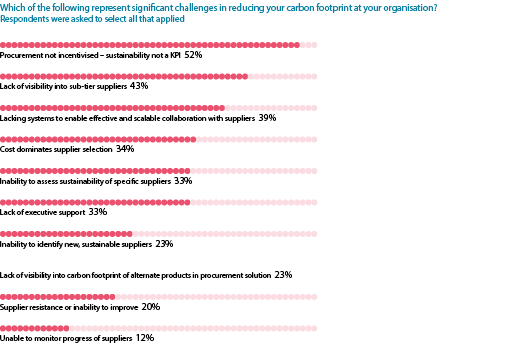Ivalua Named A Leader In The 2025 Gartner Magic Quadrant™ For Source-To-Pay Suites Report
View Report
Ivalua Named A Leader In The 2025 Gartner Magic Quadrant™ For Source-To-Pay Suites Report
View Report
Blog »

by Alex Saric
Originally published in the 2022 ProcureCon Report “Transforming Procurement: Embracing Digital Innovation and Driving Sustainability”
Ethical business practices and sustainability initiatives are forcing organizations to not only stand up, but to also set themselves apart from the competition by implementing ESG and CSR commitments.
Sustainable and socially responsible procurement practices that cover the full spectrum can provide end-to-end visibility that facilitates monitoring and compliance, and delivers continuous value to the business. Among these practices are supplier identification through sourcing, relationship management, and reporting.
For Heads of Procurement, CSR is now a major consideration. In our survey, Heads of Procurement ranked supply chain fair labor practices (68% of respondents) and preventing bribery and corruption (52%) as a high priority in their CSR endeavors.
Strategies to Improve Sustainability in Procurement
Designing for sustainability at scale requires procurement leaders to remain aware of global market dynamics. Changing policies and attitudes regarding labor practices, the environment, and other pertinent issues, all play a role. Their supply chain partners’ capabilities and activities must also be considered.
Data-driven approaches in which all parts of the supply chain are readily available to heads of procurement is essential for extracting actionable insights and crafting effective spend management solutions. 55% of our respondents cited collaboration with all stakeholders to set improvement goals as top strategy to improve sustainability. Notably, 43% of our respondents also identified visibility into their sub-tier suppliers as an important strategy.
As CSR and ESG emerge as competitive differentiators in the current market, our survey found that heads of procurement take a generally positive view of their organizations’ performance on sustainability relative to competitors. 41% of our respondents view their performance as slightly better than the competition, while 18% of respondent organizations consider their sustainability stance to be significantly better than the rest of their industry.
“Procurement leaders must beware overconfidence. We consistently see a majority of leaders assess their teams’ performance as better than their competitors when this can’t be the case. In this survey, 60% view their sustainability performance as better versus only 6% as worse. An inflated assessment of where you stand today reduces the motivation to improve tomorrow. This will ultimately put you at a disadvantage versus hungrier and more realistic competitors, ” says Ivalua Chief Marketing Officer Alex Saric
Challenges In Promoting Sustainable Practices
The United Nations Intergovernmental Panel on Climate Change Special Climate Report published last year called attention to the global consequences of continued carbon emissions. As a result, many large corporations are committing to net-zero emissions across their supply chains by 2050.
However, obstacles to meeting such pledges remain. 52% of procurement leaders in our survey point to the fact that their organizations do not provide the profession with incentives to reduce their carbon footprint – to the extent that sustainability is not even considered as a KPI. 43% of respondents mention the perennial issue of a lack of visibility into their sub-tier suppliers.

While setting improvement goals in collaboration with all stakeholders is an important consideration for over half of our survey respondents in improving sustainability, gaining greater visibility into the supply chain is also key. This is an area of high risk which also presents challenges in several areas, including monitoring labor practices and environmental performance. Businesses are starting to shift their principles, becoming more transparent, collaborative, and environmentally responsible to adhere to sustainability initiatives.
For more sustainability content, please check our other ESG-related blogs!
EMISSION: IMPOSSIBLE 4 Steps to Kickoff your Decarbonization Strategy
Delivering Step Change Improvements in ESG Performance

Alex has spent over 15 years of his career evangelizing Spend Management, shaping its evolution and working closely with hundreds of customers to support their Digital Transformation journeys. As CMO at Ivalua, Alex leads overall marketing strategy and thought leadership programs. Alex also spent 12 years at Ariba, first building and running the spend analytics business as General Manager. He then built and led Ariba’s international marketing team until successful acquisition by SAP, transitioning to lead business network marketing globally. Earlier, Alex was a founding member of Zeborg (acquired by Emptoris)where he developed vertical Procurement applications. He began his career in the U.S. Cavalry, leading tank and scout platoons through 2 combat deployments. Alex holds a B.S. in Economics from the U.S. Military Academy at West Point and an international M.B.A. from INSEAD.
You can connect with Alex on Linkedin